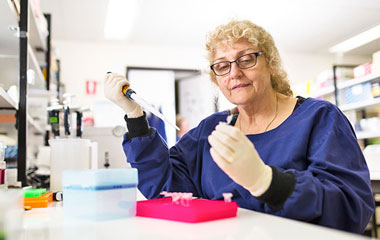Better bone marrow transplants

The stage one clinical trial has been conducted by RBWH haematologist Dr Siok Tey and her QIMR Berghofer research team.
Bone marrow transplantation is the only chance of a cure for patients with high-risk forms of blood cancer, Dr Tey said, with about 700 Australians undergoing a bone marrow transplant each year.
“However, there are many others who need a transplant but cannot undergo one because they do not have a suitably matched donor,” she said.
“The key to bone marrow transplantation is the immune cells. Immune cells are a double-edged sword – they are necessary for fighting cancer and infection but they can also cause unwanted tissue damage, known as graft-versus-host disease.
“This is why we generally need to use fully-matched donors. In this clinical trial, for the first time in Australia, we used genetic engineering to make transplantation safer so we could use donors who were only partially matched.
“We take the immune cells from the partially matched donors, then we insert a gene into these cells which enables the cells to be killed off if they cause complications, such as graft-versus-host disease.”
Dr Tey said the genetic engineering was performed at QIMR Berghofer’s cell manufacturing facility, Q-Gen Cell Therapeutics and patients received the immune cells after their bone marrow transplant at the RBWH.
“What we found really amazing was that these immune cells can massively grow in number in the patients,” she said.
“We were able to show, using two independent molecular techniques that a single genetically modified immune cell, when challenged by a cancer, could split into millions and millions of cells within a few days.
“This immense capacity for rapid expansion was something that had not been shown before and really demonstrates the ‘power of one’: One cell, if it is the right cell, can grow rapidly and help control cancer or infection.”
Dr Tey said although it was a small clinical trial, it was critical in demonstrating the ability of even a single cell to control cancer and infection.
“Our trial gives hope to all the people who haven’t been able to find a suitable bone marrow donor in the past.
“It’s exciting that this huge technological development is happening here in Queensland, at QIMR Berghofer and the RBWH. It is also exciting that this study paves the way for the use of other gene-engineering technology that has supercharged the cancer immunotherapy field in the past five to 10 years.
“We are now working on our next generation of clinical trials to use gene-modified cells to fight blood cancer and treat complications of bone marrow transplantation.”
